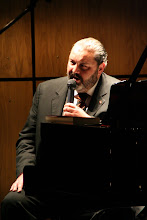terça-feira, 6 de agosto de 2013
Crítica(s) 2
TOMÁS DE LIMA Piano Sonatas: Nos. 1-4. Piano Sonatinas: Nos. 1-2. Algarve. Ilha do Paraiso • Miguel Campinho (pn) • NUMÉRICA NUM 1249 (140:25) Spoken program notes in English and Portuguese It’s just as unfair to call Eurico Tomás de Lima (1908-1989) the Portuguese Medtner as it is to call Medtner the Russian Brahms—but it’s fairer than calling him the Portuguese Messiaen or the Portuguese Carter. Despite a few nods to Iberian folk music (say, in the last movement of the Second Sonatina or the fifth movement of Ilha do Paraiso) and some near-Eastern coloration in the first movement of Algarve, he hews fairly closely (as Miguel Campinho’s lengthy and illuminating notes remind us) to the Austrian-German romantic tradition. And despite some dipping into whole-notes scales and some wrong-note harmonies of the sort Prokofiev was exploring in his early years (the demeanor of the opening movement of the Third Sonata has more than a fleeting resemblance to the idiom of Suggestion diabolique), his music remains loyal to tonality. Old fashioned? Certainly, there’s nothing in any of these compositions that betrays its date of composition. Rather than pursue the new paths represented by the avant-gardes of his time, Tomás de Lima seems (on the evidence here) to have preferred to develop the virtuoso romantic tradition of the generation before him. Thus, for the most part, these are technically challenging works notable for their heroic striving (try the dramatic finale of the Second Sonata), their elaborate textures, and (most striking, I think) their often bittersweet harmonies. But unless you have a dogmatic commitment to art that chases the moving target of the cutting edge, you’ll find plenty to enjoy here—certainly, enough to make you wonder why this music has remained so little known (Tomás de Lima doesn’t even get a bio in the latest Grove). Granted, there are moments where he strait-jackets his rhythms and phrases; there are moments of gestural doggedness (“Penha d’Águia,” from Ilha do Paraiso, seems almost like a Hanon Etude); and there are spots, in the more illustrative music, where the music doesn’t quite match the supposed subject (we’re told that the third movement of Algarve represents “the famous conqueror of the kingdom of the Algarve” as he “arrives tempestuously in a cavalry charge against the infidels,” but the music sounds a lot jollier and more whimsical than that). Still, the overall quality is strikingly high. Favorite moments? The emotional surge that launches the first movement of the First Sonata; the dizzy clatter of the toccata that rounds off the First Sonatina; the whimsical quirkiness of Jardins de Estói (from Algarve), a clear descendent of Liadov’s Musical Snuff Box; the tender lyricism that interrupts the first movement of the Second Sonata. If you’ve taken to such other outdated romantics as Bortkiewicz and Boyle (see 36:1), you owe it to yourself to give Tomás de Lima a try. We’re told that Tomás de Lima was a virtuoso pianist himself—and that he was a persuasive advocate for his own music. Apparently, he made some radio recordings back in the day—but I’ve never heard them, and about half of these new performances are advertised as world premiere recordings. In any case, he has a committed advocate in Miguel Campinho. There may be a touch of strain in some of the denser passages, and a want of color in spots where Tomás de Lima plays on delicacy; but for the most part, the performances grip your attention. Perfectly adequate sound, too. All in all, a welcome introduction to an essentially forgotten composer. Peter J. Rabinowitz
Subscrever:
Enviar feedback (Atom)


Hello! Thank you for your article. I’d like to try to compare it to my previous experience of learning portuguese through Skype on online classes for free. I did around 10 conversations over Skype with a native speaker from http://preply.com/en/portuguese-by-skype. And I was pretty satisfied with their Quality. I think they have a strong teaching quality. Practicing their course curriculum now I can speak portuguese like a native,But I Want to try another option.
ResponderEliminar